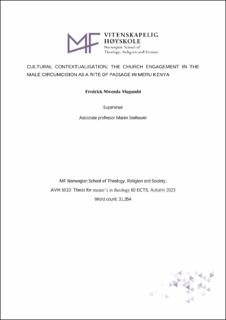| dc.description.abstract | This thesis analyses the intricate intersection between cultural traditions, religious beliefs and the evolving dynamics of male circumcision within the Meru community of Kenya. It explores the process of contextualising theology within the framework of male circumcision ceremonies in the Meru community. Male circumcision is a rite of passage that has been ingrained into the social practices of the Meru community and stands at the crossroads of evolving religious beliefs. Male circumcision among the Meru community is a timeless emblem of cultural identity and a mark of transition from childhood to manhood. The practice has evolved over time, navigating the dynamics of modernity while maintaining its cultural significance. This study has focused on the role of the church, a relatively new player in this traditional practice. The active role of the church in organising and overseeing the practice introduces a multifaceted dynamism where elements of modern religious practices intersect with traditional African practices. This interplay unfolds in the framework of contextual theology, raising questions on how religious practices are adapted within these cultural contexts.
The study adopts a qualitative approach combining interviews and observational techniques. The researcher conducted interviews with various participants who included initiates, church leaders and community elders, to understand their perception on the involvement of the church in traditional male circumcision. The interviews provided a rich qualitative data and offered a platform for community members to express their opinions. The data collected from these interviews was subjected to a rigorous thematic analysis which helped to unveil several major themes and subthemes that sum up the depth and complexity of the research findings. Key among these themes is the historical and cultural significance of male circumcision within the Meru community, the involvement of the church, and perception of the community towards the involvement of the church in this cultural practice.
The findings of this study contribute to the understanding of the interplay between cultural traditions and religious beliefs. It highlights the impact of Christian elements on traditional cultural practices and how it affects the fabric of tradition and community identity. These insights give perspectives of how cultural heritage adapts with evolving societies. The findings extend beyond the boundaries of academic inquiry and are of significance to several domains. In the context of contextual theology, the study seeks to provide a lens through which theologians and religious scholars can examine adaptability and the potential of theological perspectives in different cultural contexts. The study also offers a practical understanding of the delicate balance between tradition and faith, and it offers guidance on how to navigate the terrain of cultural adaptation while preserving cultural identity. Finally, it underscores the transformative potential of contextual theology within culturally diverse and evolving contexts. | en_US |
